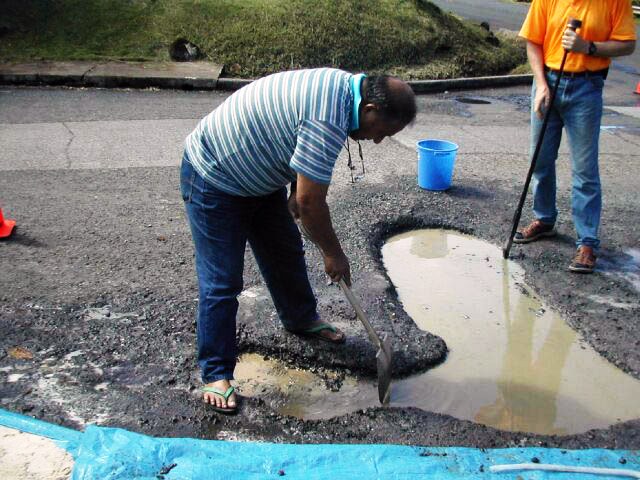
The Words of the Treacy Family

|
|
The Words of the Treacy Family |
|
Successful UPF Project In Micronesia: Dial-a-Ditch Pothole Elimination Program
Michael Treacy
October 11, 2006
Director, UPF Micronesia
Pohnpei, Micronesia

In one of the wettest places on Earth, receiving up to 400 inches (10 metres) of rain per year, Pohnpei, Micronesia faces many challenges in maintaining the badly affected road network. As with many developing island nations, roads are built by donor countries, but maintaining the road system is often left unchecked or in many cases, holes are temporarily filled with crushed coral - only to be washed out in the next downpour.
The Dial-a-Ditch Pothole Elimination Program evolved literally by accident. My wife, Beth, while driving the car, hit a six inch (15cm) deep pothole on the edge of the road near the local hospital. The tire burst on impact and the wheel buckled. She managed to control the vehicle and safely steered it into the hospital car park. The pothole had been there for at least four years and had caused a number of accidents, according to one local police officer.
After repairing the car, I went back to see what could be done about the menacing pothole. I found some discarded concrete cinder blocks nearby and smashed them into small pieces and filled the gaping hole. Some local children came to my assistance by gathering stones.
Two months later, I returned to see that the rocks had compacted and the hole was now two inches (5cm) deep. As I thought about all the cars that had ventured over the filled area and had escaped serious damage, I didn’t feel completely satisfied. Looking at the existing, rocky compaction, I thought about how to make a more permanent repair. I decided to experiment. I bought a washing tub, a shovel and a few bags of concrete mix. I mixed the concrete on the side of the road and then sealed the pothole seamlessly along the asphalt edge. It was almost perfect. Unbeknown to me, this was the beginning of a project that would win the unanimous approval of the nation and demonstrate the teaching and spirit of public service as promoted by UPF.
Later, as I drove around Pohnpei, I noticed many more potholes and wondered why someone wasn’t fixing them. After discussing the situation with one of our senior traditional leaders, including Ambassador for Peace Iso Nahnken, we made some investigations and discovered that there was no clear budget from the government to fix minor (but still dangerous) problems with the roads. At this stage, the idea of a service project sponsored by UPF began to crystallize.
With Iso’s help, we were able to have meetings with government departments and road engineers. They unanimously endorsed our researched methods of pothole maintenance using concrete or cold patch asphalt mix. We even did a trial pothole repair, just to remove any doubt from their minds about correct procedure.
A motor mechanic friend loaned me a commercial van to get started; another person gave me an unused wheelbarrow. We invested in more tools and supplies and before long, we were up and running as a project of UPF. With the support of Ambassadors for Peace and other volunteers, we were able to begin the elimination of many dangerous road conditions and provide a safer road system for the community. Our work began, however, there was still much more to do.
One of the good things about this project is that everyone benefits from the road improvements, and everyone agrees that Dial-a-Ditch is a great idea. One professional man who stopped and stared in amazement at our work in progress commented that "this is the best community project on the island that he has ever seen." At almost every worksite, we have people stopping, giving their thanks and even wanting to help in some way. It is a project that doesn’t discriminate or favor some over others. It doesn’t matter whether you are Catholic, Protestant, Muslim or Hindu, a farmer, fisherman or the President of the nation -- we all drive on the same roads, and we are all winners when the roads are safer for transporting our families and friends.
For me, coming from a country like Australia where being a ‘road worker’ is considered a desperate ‘last option,’ it has been a very humbling experience to crawl on my hands and knees, cleaning out potholes and leveling the concrete to the road surface. Also, in a hot tropical country like Micronesia, where the humidity is up around 70-80% with temperatures constantly 90 degrees F and above, it is easy to experience heat exhaustion during manual labor. In many of our jobs, we have sweated ‘bucket-loads’ together and have returned home wet with perspiration. Lots of young people see us and often want to join in to help. They can see our sincerity to make their travels more safe and enjoyable and they appreciate the work that we are doing.
This project, funded by UPF Micronesia, has been ongoing since January 2006 and has lived up to the motto of ‘Living for the Sake of Others.’ The local press has heaped praise on the project (who could think badly of it?) and many politicians have stopped to thank us for our efforts. Our small team of volunteers and other supporters in the community are committed to continue this project as long as there is a need. Our resources are low, but our enthusiasm is high and we are confident that local support will continue to grow for this innovative, but much needed project.
Download entire page and pages related to it in ZIP format
Table of Contents
Information
Tparents Home